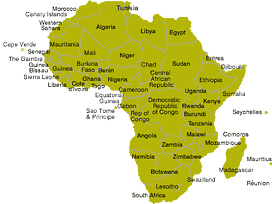| |


Algeria, Morocco and Tunisia all base their wine law on the French system of appellations d origine controlee. Many of the vineyard names reflect this heritage. Wine names vary: much wine is exported in bulk, not bottle, and label names depend on the bottler
Algeria
The quality wine zones are concentrated in the provinces of Oran and Alger on the Mediterranean coast. Seven zones are officially recognized for producing appellation d origine garantie (AOG) wine.
Oran
Oran has always been the largest winemaking province, with the best-quality wines.
Coteaux de Mascara
An AOG zone, traditionally making Algeria's best wines, big rustic reds. Noted vineyards include Clos Faranah and Sidi-Brahim. Whites are also made.
Coteaux de Tlemcen
Another high-quality AOG area, on sandstone hills near the border with Morocco, making red, white and rose wines of fair quality: powerful yet quite soft.
Other zones in Oran
Ain-Temouchent, Ain-el-Turk, Sidi-Bel-Abbes, Messarghin, La Sanca, Arzen. Monts du Tessala is AOG.
Alger
The country's second-largest winemaking province has some superior vineyards in the cool mountainous areas.
Miliana
One of the esteemed "mountain" vineyards, celebrated for their quality in colonial days, which continues to make strong red wines
Medea
An AOG zone of high-altitude vineyards, making red wines of some finesse.
Dahra
More mountain vineyards, close to the sea, on the borders of Alger and Oran provinces. Haut Dahra makes red and white AOG wines.
Mostaganem-Dahra
This region splits into four sections: Picard-Dahra for low-yielding hillside vines; Dahra-Mostaganem for red, white and rose wines of some power; Mostaganem for the same; Rivoli-Mazagran for low-yielding strong reds, stronger roses and whites.
Other zones in Alger
Ain-Bessem and Coteaux du Zaccar are AOG areas; the former generally produces better wines. Oueds Issers and Sebdou make mostly wine for everyday drinking.
Morocco
Morocco has 15,000ha (37,000 acres) devoted to wine grapes, with 12 appellation d'origine garantie (AOG) regions.
Berkane and Angad
A small area in the east, making earthy red wines.
Meknes and Fez
The biggest region, producing good reds from high-altitude vineyards beneath the Atlas Mountains. Appellations here include Guerrouane, Beni Sadden and Beni Zerhoune. The wines can be rich and chewy.
Gharb
This includes the appellations of Gharb and Zemmour. From here and to the south comes Gris de Boulaouane, a popular, light rose.
Rabat
This includes the appellations of Gharb and Zemmour. From here and to the south comes Gris de Boulaouane, a popular, light rose.
Casablanca
Coastal vineyards that include the appellation of Zenata.
Tunisia
Under a wine law of 1957, Tunisia has a four-level classification system: vins de consommation courante, vins superieurs, vins de qualite superieure, and appellation d'origine controlee.
The vineyards are in the north-east of the country, east and west of the capital, Tunis. Red wines were the best under French rule, though Tunisian rose was fashionable for a time after World War II.
Today, it is the Muscats that provide the country's best wines. The vineyards around Bizerte in the north specialize in Muscat, as do those near Hammam-Lif outside Tunis, and around Grombalia and Bou-Arkoub in the east of the country.
|
|
|
|




